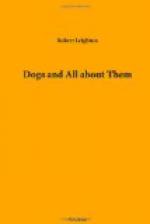to establish a race that shall average from 32 inches
to 34 inches in dogs, showing the requisite power,
activity, courage, and symmetry. HEAD—Long,
the frontal bones of the forehead very slightly raised
and very little indentation between the eyes.
Skull not too broad; muzzle long and moderately pointed;
ears small and Greyhound-like in carriage. NECK—Rather
long, very strong and muscular, well arched, without
dewlap and loose skin about the throat. CHEST—Very
deep, breast wide. BACK—Rather long
than short. Loins arched. TAIL—Long
and slightly curved, of moderate thickness, and well
covered with hair. BELLY—Well drawn
up. FORE-QUARTERS—Shoulders muscular,
giving breadth of chest, set sloping, elbows well
under, neither turned inwards nor outwards. Leg—Forearm
muscular and the whole leg strong and quite straight.
HIND-QUARTERS—Muscular thighs, and second
thigh long and strong as in the Greyhound, and hocks
well let down and turning neither in nor out.
FEET—Moderately large and round, neither
turned inwards nor outwards; toes well arched and
closed, nails very strong and curved. HAIR—Rough
and hard on body, legs, and head; especially wiry and
long over eyes and under jaw. COLOUR AND MARKINGS—The
recognised colours are grey, brindle, red, black,
pure white, fawn, or any colour that appears in the
Deerhound. FAULTS—Too light or heavy
in head, too highly arched frontal bone, large ears
and hanging flat to the face; short neck; full dewlap;
too narrow or too broad a chest; sunken and hollow
or quite level back; bent fore-legs; over-bent fetlocks;
twisted feet; spreading toes; too curly a tail; weak
hind-quarters, cow hocks, and a general want of muscle;
too short in body.
CHAPTER XVI
THE DEERHOUND
The Deerhound is one of the most decorative of dogs,
impressively stately and picturesque wherever he is
seen, whether it be amid the surroundings of the baronial
hall, reclining at luxurious length before the open
hearth in the fitful light of the log fire that flickers
on polished armour and tarnished tapestry; out in the
open, straining at the leash as he scents the dewy
air, or gracefully bounding over the purple of his
native hills. Grace and majesty are in his every
movement and attitude, and even to the most prosaic
mind there is about him the inseparable glamour of
feudal romance and poetry. He is at his best
alert in the excitement of the chase; but all too
rare now is the inspiring sight that once was common
among the mountains of Morven and the glens of Argyll
of the deep-voiced hound speeding in pursuit of his
antlered prey, racing him at full stretch along the
mountain’s ridge, or baying him at last in the
fastness of darksome corrie or deep ravine. Gone
are the good romantic days of stalking beloved by
Scrope. The Highlands have lost their loneliness,
and the inventions of the modern gunsmith have robbed
one of the grandest of hunting dogs of his glory, relegating
him to the life of a pedestrian pet, whose highest
dignity is the winning of a pecuniary prize under
Kennel Club rules.




